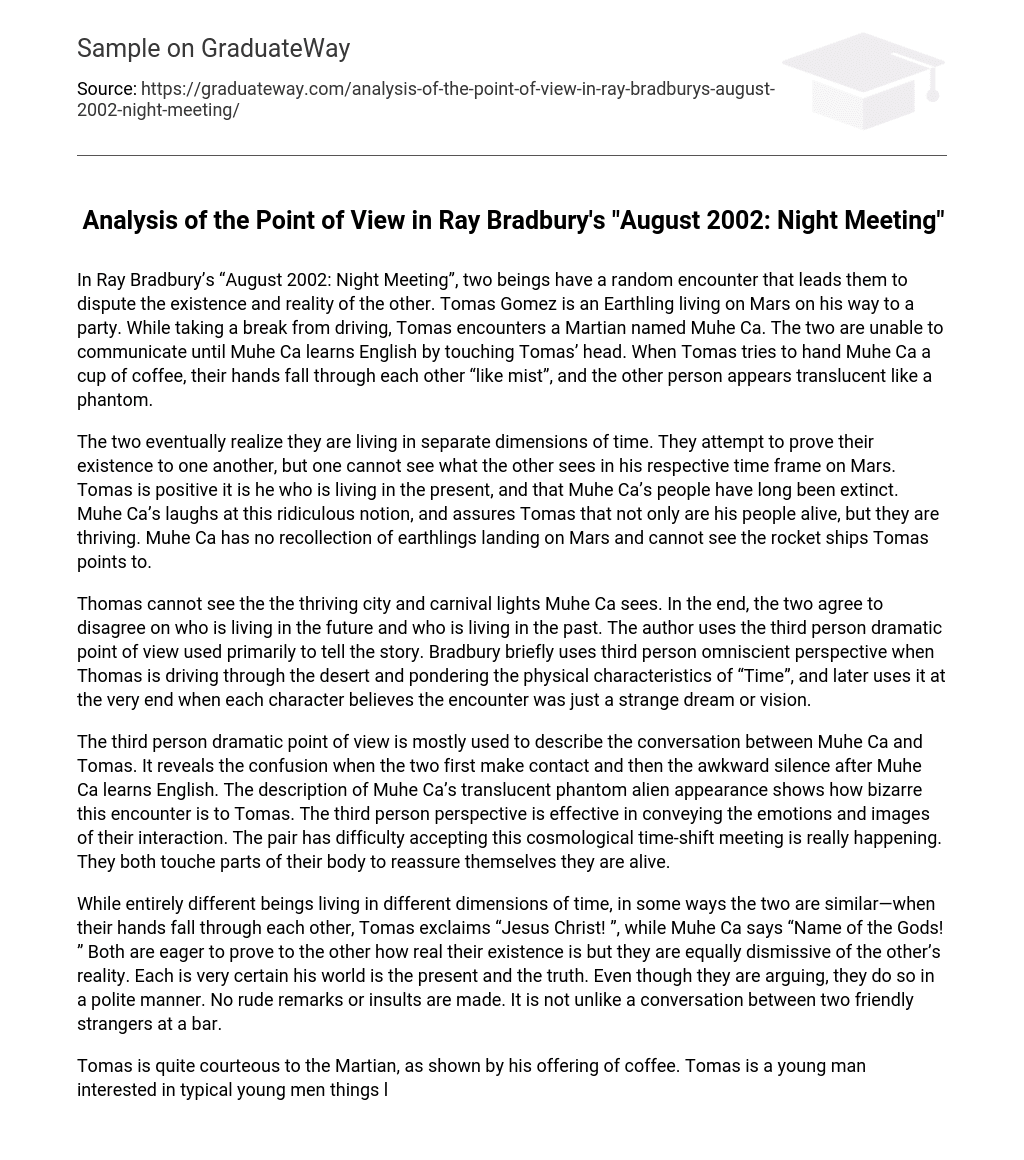In Ray Bradbury’s “August 2002: Night Meeting”, two beings have a random encounter that leads them to dispute the existence and reality of the other. Tomas Gomez is an Earthling living on Mars on his way to a party. While taking a break from driving, Tomas encounters a Martian named Muhe Ca. The two are unable to communicate until Muhe Ca learns English by touching Tomas’ head. When Tomas tries to hand Muhe Ca a cup of coffee, their hands fall through each other “like mist”, and the other person appears translucent like a phantom.
The two eventually realize they are living in separate dimensions of time. They attempt to prove their existence to one another, but one cannot see what the other sees in his respective time frame on Mars. Tomas is positive it is he who is living in the present, and that Muhe Ca’s people have long been extinct. Muhe Ca’s laughs at this ridiculous notion, and assures Tomas that not only are his people alive, but they are thriving. Muhe Ca has no recollection of earthlings landing on Mars and cannot see the rocket ships Tomas points to.
Thomas cannot see the the thriving city and carnival lights Muhe Ca sees. In the end, the two agree to disagree on who is living in the future and who is living in the past. The author uses the third person dramatic point of view used primarily to tell the story. Bradbury briefly uses third person omniscient perspective when Thomas is driving through the desert and pondering the physical characteristics of “Time”, and later uses it at the very end when each character believes the encounter was just a strange dream or vision.
The third person dramatic point of view is mostly used to describe the conversation between Muhe Ca and Tomas. It reveals the confusion when the two first make contact and then the awkward silence after Muhe Ca learns English. The description of Muhe Ca’s translucent phantom alien appearance shows how bizarre this encounter is to Tomas. The third person perspective is effective in conveying the emotions and images of their interaction. The pair has difficulty accepting this cosmological time-shift meeting is really happening. They both touche parts of their body to reassure themselves they are alive.
While entirely different beings living in different dimensions of time, in some ways the two are similar—when their hands fall through each other, Tomas exclaims “Jesus Christ! ”, while Muhe Ca says “Name of the Gods! ” Both are eager to prove to the other how real their existence is but they are equally dismissive of the other’s reality. Each is very certain his world is the present and the truth. Even though they are arguing, they do so in a polite manner. No rude remarks or insults are made. It is not unlike a conversation between two friendly strangers at a bar.
Tomas is quite courteous to the Martian, as shown by his offering of coffee. Tomas is a young man interested in typical young men things like partying and girls. He talks about drinking whisky, barn dances, and about the rockets bringing in their wives and girlfriends. His laughs and smiles show he is good-natured. Muhe Ca is likely a very similar alien age to Tomas. He speaks about floating on the waters all night long drinking, singing, and making love at the festival. We know he is a male by the way he compares beautiful boats to slim women and his overall demeanor.
Muhe Ca shows his philosophical side with this statement: “What does it matter who is Past or Future, if we are both alive, for what follows will follow, tomorrow or in ten thousand years. ” He has a sense of humor, as evidenced by laughing at Tomas’ assertion of the nearby city being dead. The two seem to relate to one another rather well. The reality and fear from knowing that either one of their civilizations will cease to exist one day creates a bond between them. Before departing, Tomas offers a ghostly hand to bid Muhe Ca farewell.
They remark how they wish they could visit the other’s world. The external conflict between the Tomas and Muhe Ca revolves around who is past and who is future. Neither can definitively prove whose civilization came first. As they head their separate ways, the two dismiss their encounter as a crazy dream or vision not to be too seriously considered because there is celebrating to be done. Still, they are now more aware of their own mortality. Their lives, their civilizations, are such tiny blips in the great universe but to dwell on such unnerving paradoxes would be a waste of precious time.





